Tag Archive: evidence
September 13, 2017
by Carole Zangari -

Measuring progress is part of good therapy and instruction, but knowing how to address this in meaningful ways for AAC learners can be tricky. In today’s post, AAC expert Gail Van Tatenhove discusses the who, what, when, where, why, and how of AAC data collection for school-based teams. The video is part of the Power AAC initiative at PaTTAN. Many thanks to their wonderful AT Team and to Gail for this wonderful presentation. Handouts for this presentation can be downloaded here. You can see more videos and material from Gail in these previous posts.
Filed under: Video of the Week
Tagged With: data collection, evidence, Gail Van Tatenhove, PaTTAN
December 31, 2014
by Carole Zangari -
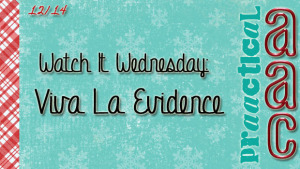
“A 21st century clinician who cannot critically read a study is as unprepared as one who cannot take blood pressure or examine the cardiovascular system.” What better way to end one year and usher in the new, than a reminder of the role of scientific study in our profession? In AAC, there isn’t as much research as we would like, but we sure do need to make it our business to evaluate and use the empirical evidence that we do have. P.S. We like Coldplay a little more now. ::::::::::::::::::::::::::::::::::::::::::::: Glasziou, P., Burls, A.,& Gilbert, R. (2008). Evidence based medicine and the medical curriculum: The search engine is now as essential as the stethoscope. The BMJ, 337, 704. Direct Link to Video: https://www.youtube.com/watch?v=QUW0Q8tXVUc
Filed under: PrAACtical Thinking
Tagged With: Coldplay, EBP, evidence, research
June 26, 2013
by Carole Zangari -
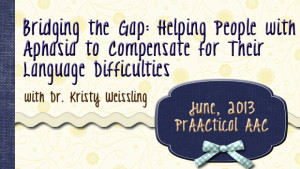
We’re wrapping up Aphasia Month with another fine post from Dr. Kristy Weissling. You can see her earlier posts here and here. In this post, Kristy shares her thoughts on how SLPs can use AAC supports to help individuals with aphasia compensate for their language difficulties. In 2010, my colleague, Carrie Prentice, and I talked about the role of both remediation and compensation in the speech rehabilitation programs of people with aphasia. At that time, we were trying to emphasize that at any particular time in the rehabilitation process, from acute care to outpatient rehabilitation, all possible alternatives should be balanced to create an individualized treatment program. Both restorative and compensatory mechanisms are available to therapist throughout this process. We proposed the work of Dixon, Garrett, and Backman (2008) to formulate a framework for discussing compensation. Six mechanisms of compensation were identified in their chapter on principles of compensation in... [Read More...]
Filed under: PrAACtical Thinking
Tagged With: aphasia, EBP, evidence, Kristy Weissling
June 24, 2013
by Carole Zangari -
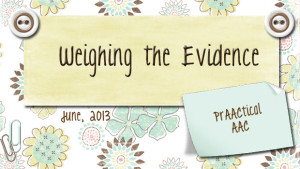
When people have significant communication difficulties that severely restrict their participation in daily life experiences, professionals and families alike sometimes find themselves attracted to the use of unproven methods. Although this usually comes from a good place, (i.e., the fervent desire to help someone), we have to be very careful in facing these decisions. Like you, we’ve heard comments like “Let’s try it. What’s the harm?” and they scare us. The harm can be difficult to quantify but is real nonetheless. Just talk to Gracie, whose mom cancelled therapies one summer and used the monies to take her swim with the dolphins. We’re not dolphin-haters, but there’s not much they can do for apraxia. We thought it was a good time to revisit this tutorial on differentiating science from pseudoscience. Many thanks to Dr. Caroline Bowen for hosting this article on her terrific website, Speech Language Therapy.com. Finn, P., Bothe,A.,... [Read More...]
Filed under: PrAACtical Thinking
Tagged With: best practices, EBP, evidence, pseudoscience, research, science
December 16, 2012
by Carole Zangari -
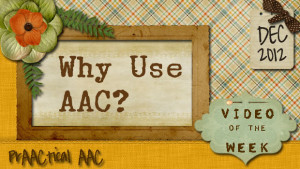
Do you work with colleagues and families who have concerns about using AAC? Get questions about whether AAC is really necessary? Overhear remarks about not wanting to “give up on speech?” So do we. We’ve planned a few screencasts to help in addressing these issues. Here’s the first one.
Filed under: Video of the Week
Tagged With: clinical rationale, concerns, evidence, giving up on speech, intervention, myths, research support, speech only
October 26, 2012
by Carole Zangari -
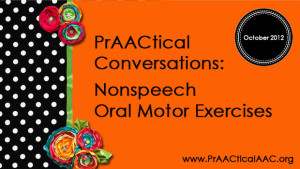
There are some good reasons to use nonspeech oral motor exercises, like blowing, puckering, tongue lateralization, and stretching. For a period of time, I used resistance exercises extensively with one client to improve the resting posture of his articulators and help him keep his mouth closed. Good for hygiene and to reduce his exposure to germs. Using these strategies, lots of children have gained strength and control that allowed them to better bite, chew, and swallow their food. Oral motor exercises can result in some meaningful gains. According to the research, however, improved speech articulation is not among them. There have been a number of studies on this approach, including some strong systematic reviews by McCauley and others. This summary by Dr. Greg Lof (Chair of the Department of Communication Sciences and Disorders at Massachusetts General Hospital Institute of Health Professions) is a few years old but is worth another... [Read More...]
Filed under: PrAACtical Thinking
Tagged With: controversy, EBP, evidence, nonspeech oral motor exercises, research, resources





